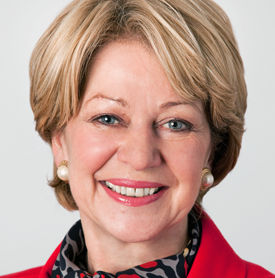The new president of the Million Dollar Round Table (MDRT), Caroline Banks of the United Kingdom, sees the axing of commissions in her country as a business opportunity rather than a scourge for financial advisors.On Sept. 1, Caroline Banks – a chartered financial planner – became the fourth woman to preside over the MDRT, a grouping of the world’s top insurance and fund sellers. She is the 89th president since the Association’s inception in 1927, and only the second UK native to fill this role, following Tony Gordon in 2001. Banks shared her views on the future of the industry in the UK in an exclusive interview with The Insurance and Investment Journal. It coincided with the MDRT annual meeting held in Toronto in June, where her appointment as president was announced in front of 9,000 participants from 74 countries.
The United Kingdom’s financial services sector entered a new era on Jan. 1, 2013 when the Financial Services Authority banned commissions. Under the Retail Distribution Review, advisors are now paid a fee per service provided. Prior to the commissions ban, worst-case scenarios bandied about included a sharp decline in the number of financial advisors. Instead, the profession grew by 6%, says a report by the Financial Conduct Authority (FCA) published in July 2013.
Banks is quick to admit that her practice, concentrated on a high net worth clientele, shielded her business from any ill effects of the commissions ban. Managing director of a London-based chartered financial planning firm, Caroline Banks and Associates, she was already receiving much of her compensation in fees. She is also a pioneer in her sector. A 25-year member of the MDRT, she has earned the honour of qualifying for the Top of The Table (TOT) 20 times.
The new MDRT president thinks the ban has refined the U.K. market.
Educational requirement
In addition to nixing commissions in the United Kingdom, the FSA has ruled that all financial advisors must now reach level 4 of the National Qualifications Framework to be authorized to offer advice. This level corresponds to a university degree. Although this new educational requirement is accentuating the threat to the advisor profession, newcomers are still joining the industry, Banks says. “We still have a lot of new blood coming into financial services who are highly qualified younger people. They are coming in to support somebody like me. They won’t give advice but they may be sitting in on meetings, writing reports and doing research. They are known as paraplanners.”
The cutting of commissions has even had a positive effect on advisors and their firms, she adds, especially financial planners. Advisors paid by commission risk providing planning services without receiving compensation. “You know that if you get to that point of developing a highly detailed report, it’s because the client actually commissioned you to do that and is ready to pay for it,” she points out. The ban thus let advisors better segment their clientele. “It’s made us smarter business people. You learn to classify your client,” she says.
Another consequence of the ban, the reduction in service to low net worth clients, is stoking controversy. “Somebody in the middle (class) would not be prepared to pay fees for my services,” Banks says. She points out that the government is trying to take charge of this segment in the United Kingdom. “Automatic pension enrollment in my country has started.”
One solution proposed is the National Employment Savings Trust (NEST), a plan similar to Canada’s Pooled Registered Pension Plan (PRPP). Under a new law that will gradually take effect in the United Kingdom and will fully apply in 2018, employers are obliged to automatically enroll employees ages 22 and over in an existing plan or in the NEST. The government argues that this provision will let them reach between five and six million workers without plans.
“I wish it could be the same thing for insurance. Because people don’t rush for insurance,” Banks observes. Her target clientele must be self-reliant for both insurance and savings. “I’m privileged: my clients are at the highest end,” she says. All the same, she thinks that this segment has a pressing need for financial planning.
Protection gap
UK statistics portray a business community in a precarious financial situation. A study of the business market shows an enormous gap between the insurance needs of businesses and their actual coverage. According to figures from Legal & General, who updated information previously supplied by a Swiss Re study, the business protection ‘gap’ stood at approximately £1.35 trillion in 2013. This gap includes a corporate debt gap of over £223 billion; a shareholder protection gap of over £683 billion and a key person protection gap of just over £439 billion, says Legal & General.
“Businesses have always had to adapt to survive but recent economic pressures have meant that the pace of change has sped up significantly and as a result UK businesses are holding more un-indemnified risk than ever.”
Banks sees great potential in her aging clientele. She appeals to their children by highlighting their life insurance and critical illness needs, while her existing clients are more interested in tax planning. “Estate tax in my country is 40%. You can leave £325,000 free of taxes (a couple can leave £650k) if on first death all is left to the other, but then it’s 40 percent of everything.”
The accumulation portion of savings in financial planning is particularly important for younger clients, especially because today it is a struggle to find a home for under £700,000 in the London area, Banks explains.




